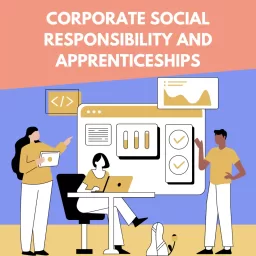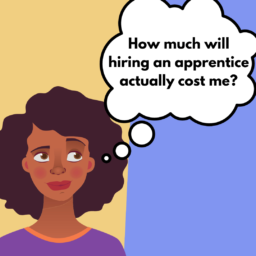So you’ve hired a marketing apprentice, now what?

Okay, don’t panic, it’ll be alright. Apprentices are pretty much the same as any other employee. They need just as much support and development as any person starting in your company or industry.
As an employer, there are several steps you can take to provide effective support for an apprentice in your workplace. These actions will help them make the most of their induction and apprenticeship programme. By offering a little additional support, you can boost your apprentice’s chances of succeeding on their programme, and their overall career trajectory. No pressure… But seriously, you’ll be fine.
Fail to prepare, prepare to fail
Work with your training provider and your designated Coach to gain a thorough understanding of the programme during the initial planning phase. This process not only helps dramatically for effective training and management but will alleviate a lot of headaches as your learner goes through their apprenticeship. Try your best to understand the journey, requirements of the standard, and ultimately what you’ll need to do as their manager to positively affect the experience. A key element of this is understanding whether you’ll need other people’s help with meeting the requirements of their course. For example, will they need to work with specific individuals or teams to get access to tools and evidence? Don’t worry, you can work on this with your designated Coach.
Give others the heads-up
Making sure the rest of the team or organisation is aware that you have an apprentice starting is a great move. This could be something as simple as trotting over to Coleen’s desk and letting her know the exciting news or sending out an @all on Slack. It’s vitally important that you inform them never to look directly into their eyes though as they’ll be turned to stone… Wait, that’s Medusa. Really, just treat them as you would a new starter. Be friendly and keep them away from the grumpy IT guys.
Tailor their induction
Develop a structured onboarding plan. You don’t want to go into this aimless. Even if you’re a really small team, just outline some things you’d like them to cover or do in their opening week or two. Remember, if they’re younger learners, they may be intimidated by the experience. If they’re older, hey, just throw them to the lions. No, don’t please! On a serious note consider incorporating things like SMART goals aligned with the apprenticeship programme as well as meet and greets, etc. Your designated Coach can work with you on this if you need help. Also, younger apprentices and those with no experience may require additional support in understanding their roles and responsibilities within the workplace so be sure to go over what they’re there to do.
Make sure they’ve got all the tools
Within the first couple of weeks, you want to make sure your apprentice has everything they need to do their job. Make sure they’ve got their laptop, email, Slack, Hubspot account, etc, all ready and working. This ensures that you’re able to follow any plans you set at the start to ensure they hit the ground running. Don’t let those pesky IT guys mess that up for you! Okay, maybe I’m picking on the IT lot too much now…
Be their Yoda
As a manager, you fit the role of mentor naturally, however, sometimes, it may be better to assign another member of the team, especially if they’re perhaps more aligned in their role and duties, etc. Worst case, assign a couple of mentors in case one of you is away. From experience, using a mentoring programmes has proven to have a positive impact on apprentice retention for employers. They’re apprentices afterall, they’re there to learn and be supported in doing so. Support from a mentor will help build the apprentice’s expertise and confidence, facilitating their ongoing personal development, particularly for young or inexperienced apprentices.
Regular catch-ups and 1 to 1s
Regular catch-up meetings provide your apprentice with a platform to address any concerns or issues related to the programme, role, or brand of coffee you choose to buy in industrial drums. You don’t need to go over the top with these meetings, but maybe once a month once you get going and then transition into your regular run of things. It’s important to remember that if your apprentice works remotely they’ll lose out on some of the regular social situations we all experienced when we worked in offices. Maybe schedule some meet and greets with other individuals, or make a conscious effort to have a casual Friday meeting so you can chat.
Where we come in
All apprentices, well, we hope so, will also be supported by their Training Providers. We want all of our learners to have a great experience on their programmes. But, we know from time to time everyone can have issues. So, if at any time, your learner needs support, to talk, or whatever it may be, our Coaches will offer the best support they can. Likewise, if you as a manager or mentor are struggling, you can talk to us and we’ll see how we can help.
That’s about it. Now go forth and manage ’em
Honestly, you’ll be fine. Working with apprentices can be an incredibly rewarding experience and we’ve worked with hundreds of managers that loved it. Just make a plan, try to understand the requirements of the programme, and support them in their development and before you know it they’ll be flying at the same speed as the rest of your team. We’ve written a short guide on how to support your learner through their EPA if you’re interested.
















